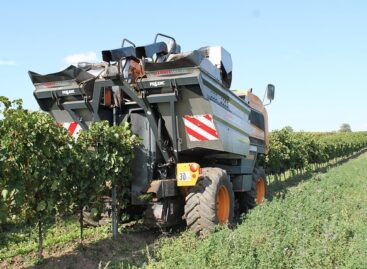New regulations affect wine producers
Wine producers must adapt to new rules. Within the framework of the extended producer responsibility system, a simplified administrative and lower flat-rate fee will be introduced for the wine industry, new regulations for the mandatory packaging material redemption system have been published and, in certain cases, some wine products will be exempted from paying the representation tax from November 15.

(Photo: Pixabay)
In accordance with European Union regulations, the extended producer responsibility system created to fulfill these regulations will be introduced in Hungarian waste management on July 1, 2023. As a result of the consultation with the National Council of Mountain Communities, the government decided that the amount of the fee to be paid by the sector for waste management within the framework of the EPR system in relation to wine products cannot be higher than the amount of the product fee that has been applied up to now. Due to the peculiarities of production, a flat fee is introduced for the winemakers in order to reduce significant administrative burdens, which includes not only the bottle of the wine product but also all the packaging materials related to the bottle. With the current amendment to the regulations regarding the EPR system, the specific flat-rate rates have been determined, which will apply retroactively from July 1, 2023. In addition to the winemakers, the decision also affects the approximately 25,000 grape growers, whose income depends heavily on the success and market position of Hungarian winemakers on the domestic and export markets. The first quarter EPR data provision must be completed by October 20, 2023.
On January 1, 2024, the mandatory packaging material exchange system will start in Hungary
Based on the detailed rules that have just been published, all beverages in glass, metal and plastic bottles and cans with a capacity between one deciliter and three liters will be included in the range of products subject to a mandatory redemption fee, with the exception of milk and milk-based beverage products, including the packaging of wine products belonging to this category too. Those wineries where the volume of products sold in this way does not exceed 5,000 units per year are exempted from the new regulation. Products subject to regulation must be registered and marketed in the manner stipulated in the legislation. The regulation provides the opportunity for retailers to put products previously manufactured without the application of this legislation on the shelves until June 30, 2024, and sell them until the stock is exhausted.
Then the wines are exempt from the tax
In order to overcome the sales difficulties affecting the entire European wine market by domestic market players and to increase the sale of quality wines, from November 16, 2023, on the basis of the government’s decision, products with a protected designation of origin or a protected geographical indication purchased for business representation and as a business gift provided wine products are exempt from paying the representation tax if the product is purchased directly from the winery that produces it. Under the guidance of Pál Rókusfalvy, the government commissioner responsible for national wine marketing, the Hungarian Wine Marketing Agency will soon launch its purchase promotion campaign, taking advantage of the ease provided by the decree.
AM
Related news
Market building is the most important thing, according to the government commissioner responsible for wine marketing
🎧 Hallgasd a cikket: Lejátszás Szünet Folytatás Leállítás Nyelv: Auto…
Read more >The Ministry of Agriculture supports the grape and wine sector with subsidies and measures
🎧 Hallgasd a cikket: Lejátszás Szünet Folytatás Leállítás Nyelv: Auto…
Read more >Related news
Atmedia adds BBC Earth to its international portfolio in Hungary
🎧 Hallgasd a cikket: Lejátszás Szünet Folytatás Leállítás Nyelv: Auto…
Read more >Discover the solutions of the future on Startup Island! (Part 2)
🎧 Hallgasd a cikket: Lejátszás Szünet Folytatás Leállítás Nyelv: Auto…
Read more >









